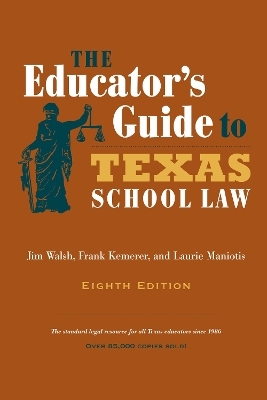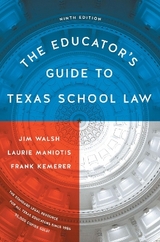
The Educator's Guide to Texas School Law
University of Texas Press (Verlag)
978-0-292-76084-4 (ISBN)
- Titel erscheint in neuer Auflage
- Artikel merken
It is important to understand the nature of the system before reading other sections. Successive chapters address attendance and the instructional program, the education of children with special needs, employment and personnel, expression and associational rights, the role of religion in public schools, student discipline, open meetings and records, privacy, search and seizure, and legal liability under both federal and Texas law. In addition to state law, the book addresses the role of the federal government in school operation through such major federal legislation as the Americans with Disabilities Act, the Individuals with Disabilities Education Act, and the Family Educational Rights and Privacy Act. Statute and case references are kept as simple as possible, and a complete index of case citations is included for those readers who wish to consult the cases themselves. The appendices describe how case law is reported and where to find it, along with a glossary of legal terms and a listing of other sources on Texas school law.
Jim Walsh is a cofounder of Walsh, Anderson, Gallegos, Green and Trevino, P.C. in Austin; managing editor of the Texas School Administrators’ Legal Digest; and editor-in-chief of Texas School Business magazine. Frank Kemerer is Regents Professor-Emeritus of Education Law and Administration at the University of North Texas and founder of the Texas School Administrators’ Legal Digest. He lives in San Diego, California. Laurie Maniotis is an attorney who investigates employment discrimination claims for the City of Fort Worth.
Preface 1. An Overview of Education Law, Texas Schools, and Parent Rights Sources of Law Constitutional Law Statutory Law Administrative Law Judicial Law The Structure and Governance of the Texas School System Texas Legislature State Board of Education and the Texas Education Agency Local School Districts Charter Schools Private Schools School Administrators District- and Campus-Level Decision-Making How the U.S. Constitution and Federal Government Affect Texas Schools Key Provisions of the U.S. Constitution Important Federal Statutes School Finance Parent Rights Rights within Public Schools Choosing Private Schools Educating Children at Home Summary 2. Student Attendance and the Instructional Program Attendance Impermissible Discrimination Residency, Guardianship, and the Right to Attend a District's Schools The Compulsory School Attendance Law Kindergarten and Prekindergarten Programs Absences Maintaining a Safe School Environment The Instructional Program The Required Curriculum Student Assessment School District Accountability The Effect of the No Child Left Behind Act Removal of Objectionable Library and Study Materials Technology at School: Computers, the Internet, and Cell Phones The Federal Copyright Law Extracurricular Activities and the UIL Addressing the Needs of Special Groups At-Risk Children Bilingual Children Gifted Children Abused and Neglected Children Summary 3. Special Education The Jargon of Special Education Federal Legislation Child Find Evaluation Eligibility Response to Intervention (RtI) ARD Committee Individualized Education Program General Curriculum NCLB and Statewide Assessments Least Restrictive Environment Procedural Safeguards Attorneys' Fees FAPE Related Services Extended School Year Services Unilateral Placements Private-School Children Discipline of Students with Disabilities Expulsion Stay Put Change of Placement Ten Days Manifestation Determinations Section 504 of the Rehabilitation Act of 1973 Summary 4. The Employment Relationship Constitutional Issues Due Process of Law How Much Process Is Due? Types of Employment Arrangements At-Will Employment Non-Chapter 21 Contracts Probationary Contracts Term Contracts Continuing Contracts Third-Party Independent Contract Educators and Retire/Rehire Selection of Staff Certification and the Role of SBEC Nondiscrimination Laws Protected Activity The Hiring Process Criminal Records The Impact of NCLB Restrictions on Employment Ending the Relationship At-Will Employees Non-Chapter 21 Contracts Probationary Contracts Term Contracts Contract Nonrenewal Contract Termination Professional Capacity Dual-Assignment Contracts Remedies Reduction in Force (RIF) Continuing Contracts The Independent Hearing System A Few Final Thoughts on "Good Cause" Constructive Discharge Summary 5. Personnel Issues Reassignment The Constitutional Issues Same Professional Capacity Compensation Issues Duties and Schedule The Commissioner's Jurisdiction Reassignment of the Superintendent Compensation Disputes Teacher Appraisal Employment Benefits Planning and Preparation Period Duty-Free Lunch Personal Leave Health Insurance Assault Leave Teacher Retirement Temporary Disability Leave Family and Medical Leave Act USERRA Miscellaneous Leave Policies Wage and Hour Requirements Workers' Compensation and Unemployment Compensation Grievances and the Role of Employee Organizations Employee Grievances: A Little History Hearing Employee Grievances The Role of Employee Organizations Collective Bargaining on the National Scene The Law in Texas Summary 6. Expression and Associational Rights Educator Rights of Expression Expression outside the School Expression within the School Electronic Communication Academic Freedom Texas Whistleblower Act Educator Freedom of Association Student Rights of Expression Communication among Students on Campus School-Sponsored Student Publications Non-School-Sponsored Student Publications and Materials Electronic Communication Student Freedom of Association Summary 7. Religion in the Schools Legal Framework No Government Establishment of Religion Free Exercise of Religion Contemporary Issues The Pledge of Allegiance School Prayer School-Sponsored or Employee-Led Prayer Silent Meditation Invocations, Benedictions, and Religious Speeches at Graduation Baccalaureate Ceremonies Student-Initiated Prayer at School, Extracurricular Activities, and Athletic Events Teaching Creation-Science Secular Humanism and Pagan Religion Religion in Classrooms, Choir Programs, and Holiday Observances Teaching about Religion Student Papers and Presentations on Religious Topics Choir Programs Holiday Observances Clergy in the Schools Distribution of Religious Literature Wearing Religious Symbols Student Religious Groups Meeting on Campus Religious Exemptions Assistance to Sectarian Private Schools Summary 8. Student Discipline Constitutional Concerns: Due Process Other Constitutional Issues Overbreadth Protected Areas Void for Vagueness Chapter 37: An Overview Student Code of Conduct Bullying Teacher-Initiated Removal Suspension Removal to a DAEP Mandatory Placements Discretionary Placements Procedure Life in a DAEP Expulsion Grounds Procedures Emergency Actions Interaction with Law Enforcement Other Disciplinary Practices Corporal Punishment Suspension from Extracurricular Activities Summary 9. Privacy Issues: Community, Educators, Students The Legal Framework The U.S. Constitution Federal Statutes State Law The Texas Open Meetings and Public Information Acts Texas Open Meetings Act Meetings and Quorums Notice Emergency Meetings Closed Sessions Tape Recordings and Certified Agendas Meetings by Telephone and Videoconference Call Internet Broadcast Violations Criminal Provisions Texas Public Information Act Items That Must Be Disclosed Personal Information Criminal History Information, Witness Statements, and Investigative Reports Inter- or Intraagency Memoranda Student Records Other Exempt Items Production of Records Educator Privacy Rights Lifestyle Issues Employee Drug Testing Personnel Records and Employee References Search of School Computer Files and Pagers Search of File Cabinets Student Privacy Rights Student Personal Privacy Student Records Parent Rights Education Records Disclosure of Records Recordkeeping Violations Child Custody Issues Student Dress and Grooming Student Search and Seizure Standards for Student Searches Strip Searches Use of Magnetometers, Metal Detectors, and Breathalyzers Locker and Desk Searches Search of Cell Phones and Electronic Communications Use of Sniffer Dogs to Conduct Searches Student Drug Testing Summary 10. Legal Liability Identifying Areas of Legal Liability State Torts School District Immunity Sovereign Immunity and Contract Cases Qualified Immunity for Public School Professional Employees The Special Case of Corporal Punishment and Physical Force Law and the School Counselor Federal Civil Rights Liability Governmental Liability Individual Liability Personal Injuries and the Constitution A Federally Protected Right The District Itself Is Responsible More Than Negligence A New Theory Liability under Federal Statutory Law Summary Appendixes A. How to Find and Read a Court Case B. Glossary of Legal Terminology C. Reference Sources Index of Cases Index of Topics Tables 1. Basic Components of Texas Education Law 2. Relationship of Law to Establishment and Operation of Texas Public Schools 3. School Finance at a Glance 4. Major School Desegregation Decisions, 1954-2007 5. Complying with Copyright Guidelines Figures 1. The Overall Structure of Texas Administrative Law 2. Geographic Jurisdiction of U.S. District Courts in Texas
| Verlagsort | Austin, TX |
|---|---|
| Sprache | englisch |
| Maße | 152 x 229 mm |
| Gewicht | 850 g |
| Themenwelt | Recht / Steuern ► Arbeits- / Sozialrecht ► Sozialrecht |
| Recht / Steuern ► EU / Internationales Recht | |
| ISBN-10 | 0-292-76084-1 / 0292760841 |
| ISBN-13 | 978-0-292-76084-4 / 9780292760844 |
| Zustand | Neuware |
| Informationen gemäß Produktsicherheitsverordnung (GPSR) | |
| Haben Sie eine Frage zum Produkt? |
aus dem Bereich



